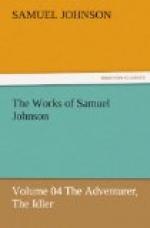If reason has the power ascribed to it by its advocates, if so much is to be discovered by attention and meditation, it is hard to believe, that so many millions, equally participating of the bounties of nature with ourselves, have been for ages upon ages meditating in vain: if the wits of the present time expect the regard of posterity, which will then inherit the reason which is now thought superior to instruction, surely they may allow themselves to be instructed by the reason of former generations. When, therefore, an author declares, that he has been able to learn nothing from the writings of his predecessors, and such a declaration has been lately made, nothing but a degree of arrogance unpardonable in the greatest human understanding, can hinder him from perceiving that he is raising prejudices against his own performance; for with what hopes of success can he attempt that in which greater abilities have hitherto miscarried? or with what peculiar force does he suppose himself invigorated, that difficulties hitherto invincible should give way before him?
Of those whom Providence has qualified to make any additions to human knowledge, the number is extremely small; and what can be added by each single mind, even of this superior class, is very little: the greatest part of mankind must owe all their knowledge, and all must owe far the larger part of it, to the information of others. To understand the works of celebrated authors, to comprehend their systems, and retain their reasonings, is a task more than equal to common intellects; and he is by no means to be accounted useless or idle, who has stored his mind with acquired knowledge, and can detail it occasionally to others who have less leisure or weaker abilities.
Persius has justly observed, that knowledge is nothing to him who is not known by others to possess it[1]: to the scholar himself it is nothing with respect either to honour or advantage, for the world cannot reward those qualities which are concealed from it; with respect to others it is nothing, because it affords no help to ignorance or errour.
It is with justice, therefore, that in an accomplished character, Horace unites just sentiments with the power of expressing them; and he that has once accumulated learning, is next to consider, how he shall most widely diffuse and most agreeably impart it.
A ready man is made by conversation. He that buries himself among his manuscripts, “besprent,” as Pope expresses it, “with learned dust,” and wears out his days and nights in perpetual research and solitary meditation, is too apt to lose in his elocution what he adds to his wisdom; and when he comes into the world, to appear overloaded with his own notions, like a man armed with weapons which he cannot wield. He has no facility of inculcating his speculations, of adapting himself to the various degrees of intellect which the accidents of conversation will present; but will talk to most unintelligibly, and to all unpleasantly.




